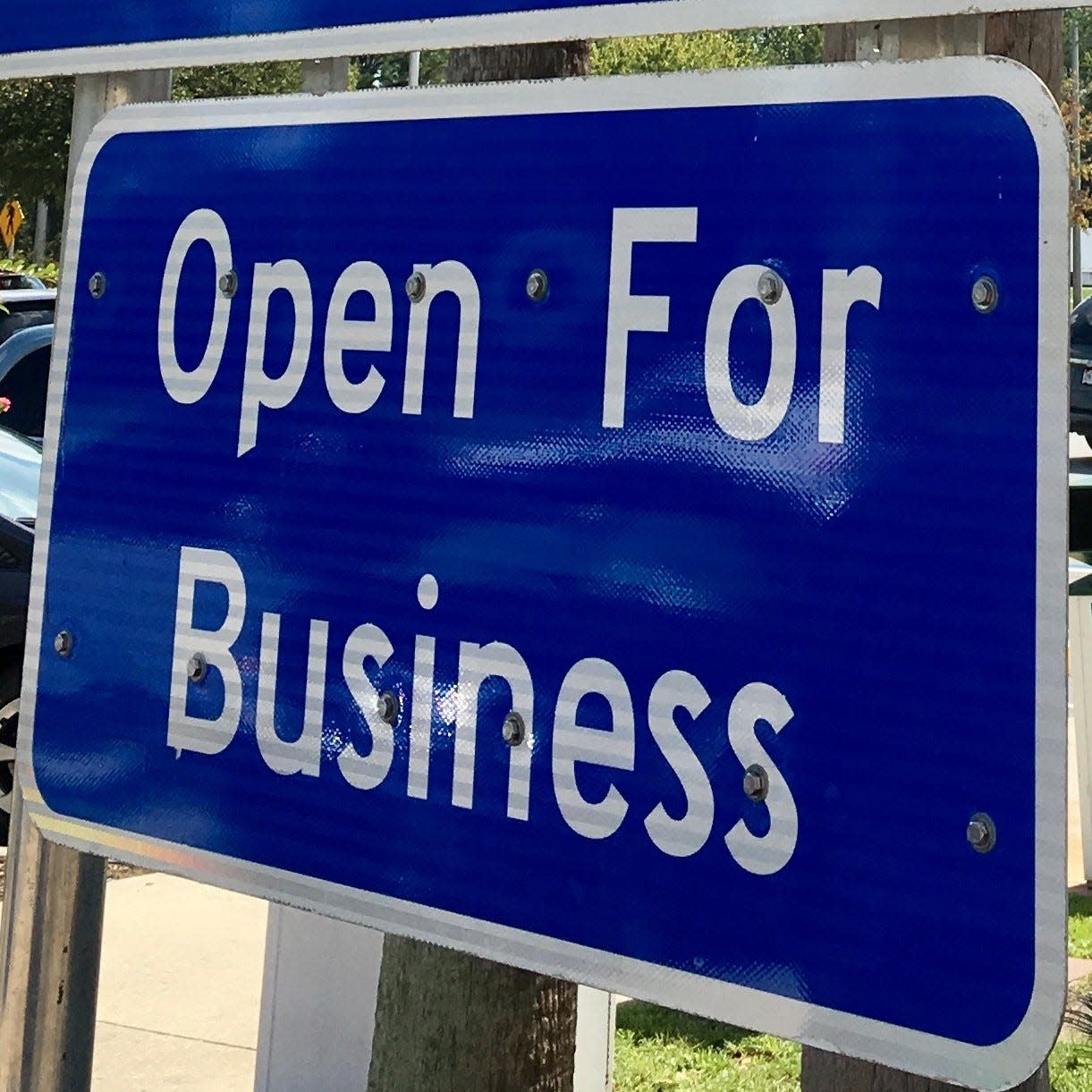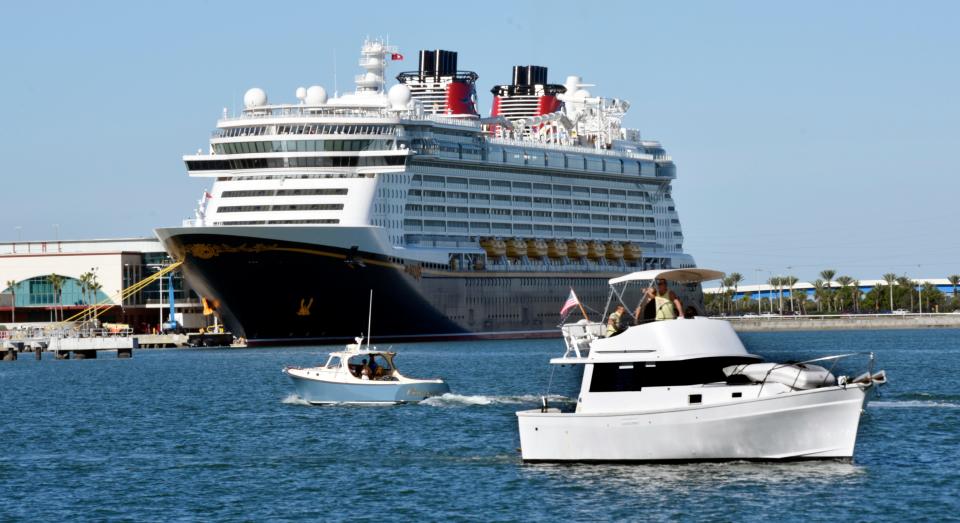Florida is 'open for business' — but in this climate, will business still come?

- Oops!Something went wrong.Please try again later.
- Oops!Something went wrong.Please try again later.
When you enter on one of the highways from neighboring states, you’re greeted by blue signs that say: "Welcome to Florida."
About a decade ago, when Rick Scott was governor, he had smaller signs added with his name and a message to visitors.
“Open for Business.”
That was Scott’s mantra. Growth and jobs, jobs, jobs. No matter the question, that was the answer.
It was a fairly standard conservative approach to attracting businesses to Florida. If you keep taxes low, remove pesky regulations and invite businesses to build it — pretty much wherever they want — they will come.
Those now feel like simpler times.
During the pandemic, Florida’s latest governor also made “open for business” a mantra. It’s more than his marketing for the state. It’s his marketing for himself, for his political ambitions.
And it has become clear that this “open for business” is different from ones in the past. Instead of the classic conservative ideal — get out of the way of businesses — it has involved telling businesses what they can and can’t do.
"Open for business" now might as well come with an asterisk, a pledge of allegiance to the Divided State of Ron DeSantis.
More than DeSantis vs. Disney
While much of the current attention is on DeSantis vs. Disney, it’s worth remembering that this is hardly his first clash with a staple of Florida tourism.
Flash back to the spring of 2021. Cruise lines were preparing to resume sailing from Florida. Norwegian Cruise Lines decided to require that every crew member and passenger show proof of being vaccinated against COVID-19 and be tested before boarding.
This was partly in hopes of avoiding turning ships into giant floating petri dishes of a contagious disease. But it wasn’t just about health. It also was about the bottom line.
Frank Del Rio, CEO of Norwegian, felt that this approach would be good for his company.
“I believe that the average American who wants to go on a cruise would prefer to go on a cruise knowing that everyone around them is vaccinated,” he told NPR.
While Norwegian bookings quickly validated this belief, there was a problem. Florida’s governor championed a state law banning businesses — including cruise ships — from requiring proof of vaccination.
DeSantis didn’t argue that it should be left up to each business in Florida, that some might choose to require vaccination and others might not. He said that none should be able to — even if they believed, as Norwegian did, it might save a sinking business.
Norwegian sued Florida in federal court, saying legal action was a “last resort” to resume operations “in a way that this cruise line has determined is best for all concerned.”
By August of that year — after a summer spike made Florida one of the world’s COVID hotbeds — the Bahamas announced that it would block cruise ships from Florida docking there unless the ships provided proof that everyone onboard and eligible to be vaccinated had done so.
Four cruise lines decided to adhere to this (again for both health and business reasons) and, in the process, buck the Florida governor.
Royal Caribbean, MSC, Carnival and … Disney.
How will today's culture wars affect tomorrow's business?
I’ve said in the past that the mere mention of a “Disney cruise” combines two of my vacation nightmares into one — and that was before COVID.

At some point since my daughter was born 20 years ago, I also wrote that there are two types of people in the world: Those who believe Disney is indeed the happiest place on earth (which includes my wife and daughter) — and those, like me, who believe it’s a 25,000-acre torture chamber.
I’ve spent years working on my own little personal Disney boycott, mainly based on long lines, prices and attractions like Disney Springs when we're surrounded by actual Florida springs. Having said this, I never imagined a day when Florida governors would be portraying Disney as anti-family.
If anything, it always felt like a place that was grooming generations of families to do something very American right here in Florida — spend money.
But that’s where we find ourselves today. With DeSantis battling one of the state's largest employers and most iconic brands. With Scott, now a senator, joining #boycottdisney and saying he canceled his Disney+ subscription and isn't planning to go back to the park.
With headlines asking: Will Disney leave Florida?
A better question might be: Will other companies come to Florida?
For all the attention about what stripping Disney of its own little tax world means, I'd be willing to bet a lot of Disney Dollars that the theme park isn’t going anywhere. But all that has happened in recent years leads to even bigger questions beyond Reedy Creek.
How will all the culture wars being fought in Florida — from new ones over math textbooks to old ones over Confederate monuments — play into the future of business here?
Sure, the tax climate and the actual climate here are appealing. But that has long been the case. And yet Florida consistently trails other states in all kinds of business metrics.
Massachusetts has the highest amount of venture capital investment. Connecticut is home to more Fortune 1000 company headquarters per capita than any other state. According to some studies, Virginia is the top state for business. According to others, it's Utah. And California, while often criticized for its business climate, still is the epicenter of technology, innovation and In-N-Out burgers.
When the latter, a beloved Western hamburger chain, got into a spat with San Francisco authorities over a COVID mandate, DeSantis invited a move to Florida.
If In-N-Out didn’t bite, Apple sure isn’t going to.
Remember the frenzied effort to lure Amazon HQ2 to Florida?
In his final months as governor, Scott made landing that second headquarters — along with more than $5 billion in construction and up to 50,000 high-paying jobs — a major focus.
Cities all over Florida put together bids. Miami, Tampa-St. Pete, Orlando, Jacksonville. Only Miami made it to the list of 20 finalists. And it never really had much of a chance. None of the Florida cities did.
Amazon will gladly build more warehouses here. But a corporate headquarters? When it said it wanted a “business-friendly environment,” it meant more than low taxes and a sweetheart deal.
That’s true of many coveted companies, both ones we’d like to see move here and ones we hope to keep here. They want a place with an educated, diverse workforce; a place with good schools, transportation, parks, quality of life; a place known for some of the intangibles that some of our state leaders might call “woke.”
Last week DeSantis signed the Stop the Wrongs to Our Kids and Employees (WOKE) Act. While much of the coverage and debate has focused on what this means for public schools, it also applies to private businesses. It not only restricts what companies can include in workplace training, it opens the door for lawsuits for perceived violations of the WOKE Act.
This, of course, is good for firing up a portion of voters, raising money and getting more appearances on Fox News?
But is it good for business in Florida?
Mark Woods is a Florida Times-Union columnis
Join the conversation
Send a letter to the editor (up to 200 words) to letters@gainesville.com. Letters must include the writer's full name and city of residence. Additional guidelines for submitting letters and longer guest columns can be found at bit.ly/sunopinionguidelines.
Journalism matters. Your support matters.
Get a digital subscription to the Gainesville Sun. Includes must-see content on Gainesville.com and Gatorsports.com, breaking news and updates on all your devices, and access to the eEdition. Visit www.gainesville.com/subscribenow to sign up.
This article originally appeared on Florida Times-Union: Mark Woods: How will Disney vs. DeSantis affect business in Florida

